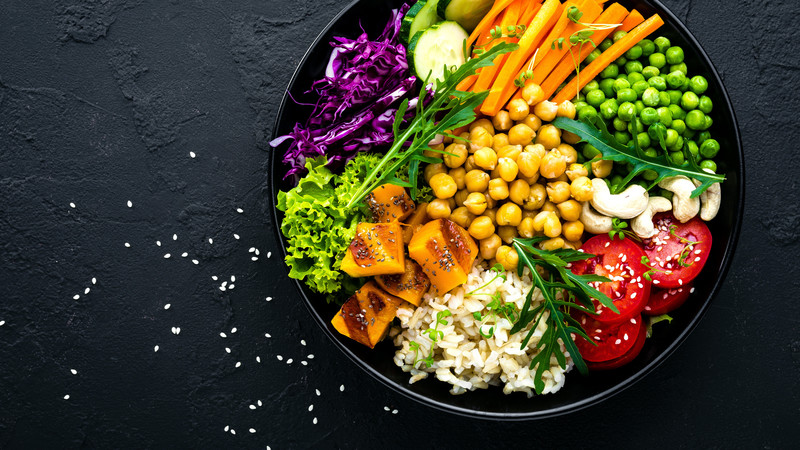Healthy Lifestyle
The Power of Nutrition in Cancer Prevention
Published: March 4, 2020With the season’s change comes a new variety of seasonal produce, inviting the opportunity to introduce new recipes and flavors into a healthy diet.
Embrace the Plants
Eating a primarily plant-based diet that’s rich in variety can benefit your health. Fruits, vegetables, whole grains, nuts and legumes are all considered plant-source foods.
With more variety comes more cancer-fighting nutrients, and you’ll also benefit from the synergistic effects of vitamins, minerals, phytochemicals and fiber from plant-source foods. A plant-based diet can reduce occurrences of colorectal, esophageal, mouth, pharynx, larynx and stomach cancers, according to the American Institute for Cancer Research (AICR).

Get to Know the New American Plate
Transitioning to a more plant-based diet doesn’t have to be an overnight change. The AICR’s New American Plate model offers guidance on adjusting your diet. The ultimate goal is to have fruits, vegetables and whole grains make up three-fourths of your plate with one-fourth being composed of lean animal-source protein, which may include dairy.
Fruits and vegetables in their raw, canned or frozen state offer the most nutrition, minimal processing and little to no additives, such as sugar and salt. Seasoning with fresh or dried herbs and spices is best and contributes phytochemical benefits.
Watch Your Meat Consumptions
When it comes to cancer prevention, it’s recommended that you have no more than 12-18 ounces of cooked red meat (beef, pork and lamb) per week, and little to no consumption of processed meats, such as cured deli meats, hot dogs and sausage-like options. Processed meats contain heme iron and nitrates as well as high-sodium content for preservation. Increased consumption of red and processed meats is strongly linked with an increased risk for colorectal cancer.
Reducing and replacing red and processed meats with lean meat options, low-fat dairy choices and/or plant-based protein sources can lower calorie consumption and promote weight loss. Maintaining a healthy weight is another AICR recommendation for cancer prevention and survivorship.
The Less Alcohol, the Better
Drinking alcohol – which contains ethanol, a known carcinogen – is also linked to increased cancer risk. Abstaining from alcohol is recommended. If you do drink, you should follow the guideline of one drink for women and two drinks for men daily.
Nutrition Guidance for Cancer Patients
Patients undergoing chemotherapy or radiation can experience nausea, poor appetite, weight loss, diarrhea, constipation, sore mouth and throat, and difficulty swallowing. But there are nutrition recommendations that can help manage side effects.
A trained clinical professional such as a registered dietitian is a great resource for patients to combat negative nutrition impacts. Methodist Estabrook Cancer Center’s Harper’s Hope Program offers dietitian services to all patients from the time of cancer diagnosis, through treatment and in survivorship. These dietitians are specialists in oncology nutrition and have a generous variety of patient resources available.
Start a Healthy Habit
Nutrition is vital to your current and long-term health. It’s important to find solutions that are sustainable enough to become healthy habits.
For more information on nutrition for cancer prevention and survivorship, visit the American Institute for Cancer Research website. And feel free to contact a registered dietitian at Methodist Estabrook Cancer Center by calling (402) 354-4282.
More Resources
- Learn more about Methodist’s nutrition and weight management services
- Set the table for cancer prevention with the New American Plate


